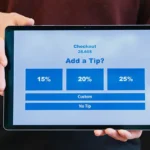by Amanda Milewski
Long gone are the days when teenagers kept track of their money with balances scrawled in a passbook. Now, as you might expect, there’s an app for that. Although some adults are holdouts and still bank the old-fashioned way, teens keep tabs on savings and checking accounts, deposit checks, and send and receive money all remotely from their smartphones.
Eldersburg resident Lynn Saum is one of the holdouts. She continues to keep a paper trail when it comes to her family’s finances. “I actually pay all of the bills online,” she said, “but I keep a written record of everything.”
Of course, some people still have an all-paper system, but for Saum a hybrid approach works best. “I don’t receive any statements or bills in the mail, but I do keep a ledger for all of our credit cards and checking account. I write every transaction in [the ledger] and then verify that my records match with what is online.”
Saum and her husband, Kevin, have three teenage daughters so setting a good example when it comes to managing money is important. “They all bank online exclusively,” said Saum. “To be honest, I don’t think they even know how to write a check,” she laughed.
Their two older daughters, Jessie and Alyssa, have part-time jobs so they need to manage their money on a regular basis. They and middle school-age sister Sammie have bank accounts linked with debit cards, and Jessie and Alyssa have credit cards so they can start building good credit.
“I use my bank card for everything because it’s so much easier than having to worry about cash,” Jessie said. “I can also keep better track of what I am spending.”
Alyssa agreed. “I like to bank online because it is quick and easy and I always have my phone with me.”
But the ease of banking online means that educating teens about how to spend and save wisely is more important than ever. This is essential as many teens are responsible for car and car insurance payments, cellphone bills and later repaying college loans. It’s no wonder that teens without a basic understanding of finances can find themselves with money woes.
Enter Katherine Rudy and Shawn Girch. Rudy teaches financial literacy at Manchester Valley High School and Girch teaches personal finance with Excel at Liberty High School. Both classes fulfill the state financial literacy requirement for graduation from a public high school.
Rudy, who is starting her 15th year teaching financial literacy, explained that the class “enables students to gain control of their money by having a strong understanding of where it comes from, how they get it, how it is used, how to protect it, how to plan for future needs and uses, and how to grow it.” Basically, the class offers a broad foundation in the fundamentals of managing money.
More specifically, according to Rudy, “Financial literacy delves into the connection between income level and higher education (including college, tech and trade institutions as well as military and work service), taxes, spending plans, income and expense statements, credit, depository institutions, savings tools, investing, insurance, personal financial goals, resources for low-income families and retirement.”
The course, which was mandated by the state in 2011, is recertified every five years, at which time updates in the curriculum are instituted.
“The curriculum is updated to reflect current financial situations and planning needs,” Rudy said. “We use many resources that are available to the public rather than just ‘pretend’ examples. For instance, rather than guessing a possible income level, we get the current information from the [U.S. Department of Labor Statistics’ Occupational Outlook Handbook].
“Our taxes unit utilizes the IRS customer resources to understand the materials and to undergo simulations to further understand how taxes are paid,” Rudy continued.
On the other hand, the personal finance class digs a little deeper into financial concepts because it is a full-credit class, said Girch. It includes an Excel component, in which students learn to create spreadsheets as a financial tool.
“Referencing Venmo and Cash App (mobile payment services) are key to students’ understanding,” said Girch. “But showing students how to complete a check is still important. The class allows students to see some essential tasks in a meaningful way so that the first time they see a credit application isn’t right before they are trying to purchase something,” he noted.
Both classes have immediate benefits for students. Liberty senior Ben Hiebler said that because of the financial literacy class, he knew how to complete a W-4 form when being hired for his part-time job. He also said that although he could have his paychecks directly deposited, “scanning my checks is so easy with the banking app” that he hasn’t bothered with direct deposit.
The ease of depositing money via app may mean teens won’t bother to set up direct deposit, especially when they may have many different part-time jobs before settling into a career.
According to a PNC Bank spokesperson, “There isn’t a lot of industry data on teen usage, but there is clear industry data that younger adults are more likely to use mobile banking than older adults, with nearly half of Gen Zers preferring to bank online.”
“The primary goal of a parent is to help their children become financially responsible. Parents are most interested in their children learning about budgeting, saving and credit card responsibility,” the spokesperson continued, further noting that children aged 11 to 12 should start learning about financial concepts, but that having a debit card should be postponed until ages 13 to 15.
Through their student virtual wallet, PNC offers money management tools such as “alerts, savings rules and goals, spending and budgeting information, and a one-time overdraft/non-sufficient funds refund,” all of which encourage and facilitate fiscal responsibility.
But if teens are banking easier and smarter online, they may not need to rely on those alerts and overdraft protections.
Jessie Saum admitted that she probably wouldn’t be as conscientious about managing her money if she couldn’t bank online. “I would probably overdraw my account because I couldn’t look to see if I had money available,” she said.
“I definitely think Venmo helps me save money,” she continued. “Since it is attached to my bank account, I always know how much I have left and when my account is getting low, it makes me second-guess my decision to buy something.”
Alyssa agreed: “I think it is much easier to save banking online. I don’t like to see a low balance so it deters me from spending.”
Raising fiscally responsible and financially independent children is an important goal for parents, whether they bank online or not.
“I have had the same system, which I learned from my father, since I opened my first bank account — a written record of everything that I can reference whenever needed,” said Lynn Saum. Even though her methods are a bit different from her daughters’, the lesson of financial responsibility is still the same. There are many tools — virtual as well as some physical — and parents and teens should research and choose those that fit best their financial goals and habits.
And although banking online — with no teller to greet you and ask how they can help — may be the prevailing method, teens and their parents shouldn’t forget that there are still people who can serve as a resource.
“I am very passionate about the students being able to go into adulthood understanding their money and having control over it,” Rudy said. “They learn through class that money is a tool to reach their goals and desires, even if they have a low income.
“By self-determination of how they want to use their money, before taking on debt, students can create a strong financial foundation.”













